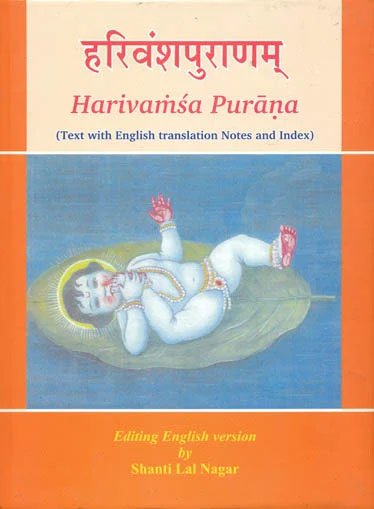Harivamsha Purana
by Manmatha Nath Dutt | 1897 | 293,872 words | ISBN-10: 8178542188 | ISBN-13: 9788178542188
This page is entitled “the story of satyavrata” and represents Chapter 12 of the first book (‘Adi Parva’) of the Harivamsa (English translation in Prose). The Harivamsha Purana narrates the lineage and life-story of Krishna (Hari). Although not officially mentioned in the list of Puranas, this book includes topics such as geology, creation theory, time (manvantaras), ancient historical legends and accounts of royal dynasties.
Chapter 12 - The story of Satyavrata
1. Vaishampayana said:—Of his three surviving sons Dridhashva is spoken of as the eldest; Candrashva and Kapilashva were the two younger sons.
2. Haryashva was the son of Dhundhumara’s son Dridhashva. His son was Nikumbhu always observant of the duties of the Kshatryas.
3. Nikumbhu’s son was Sanghatashva, well-versed in the art of warfare. O king, Sanghatashva had two sons Krishashva and Akrishashva.
4. Himalaya’s daughter Drishadvati, respected by the good and celebrated in the three worlds, was his spouse. Her son was Prasenajit
5. Prasenajit got a wife by name Gauri ever devoted to her husband. Cursed by her husband she became a river by name Vahuda.
6. His son was the emperor Yuvanashva whose son was Mandhata, the victor of the three worlds.
7. His wife was Caitrarathi the daughter of Shashavindhu—her another name was the chaste Vindumati unequalled in beauty in the world.
8-9. She was chaste and the eldest of ten million brothers. O king, Mandhata begat on her two sons—the pious Purukutsa and the virtuous Muchukunda. Purukutsa’s son was the emperor Trasadasyu.
10. He begat a son on Narmada by name Sambhuta whose son was the king Sudhanva.
11. Sudhanva’s son was Tridhanva, the represser of foes; the educated powerful king Trayyaruna was Tridhanva’s son.
12. His highly powerful son, of vicious understanding, by name Satyavrata, put obstacles to the nuptial mantras.
13. On account of his childishness, fickleness, lust, ignorance and joy he took as his wife the duly wedded spouse of another man.
14-15. Out of lust he stole away the daughter of another citizen. Pierced by the dart of iniquity and worked up with anger (therefore) the king Trayyaruna renounced him saying. "Go to rack and ruin." Forsaken by his sire he again and again said to him "Where shall I go?".
16. The father then said to him "Go and live with the Candalas.[1] O you who have sullied your family, I do not like to be the father of a son like you".
17. Thus spoken to by his father he issued out of the city. The omniscient Rishi Vasishtha did not prevent him (however)
18. O child, thus forsaken by his father the heroic Satyavrata repaired to where the Candalas were living. His father too left for the forest.
19. On account of his iniquity the chastiser of Paka[2] (Indra), did not pour rain in his kingdom for twelve long years.
20. Having made over the kingdom to his wives the great ascetic Visvamitra carried on hard penances near the sea.
21. Having tied a rope round the neck of his own begotten second son his wife sold him for a hundred coins for the maintenance of the remaining sons.
22. O descendant of Bharata, when he saw the ascetic’s son thus bound for sale the pious prince released him.
23. For encompassing Visvamitra’s pleasure and for his favour the mighty-armed Satyavrata maintained his sons.
24. On account of his being bound by the neck the great ascetic passed by the name of Galava. And that great saint Kausika was released by that heroic (king).
Footnotes and references:
[1]:
A low caste people, by living with whom the people are outcasted.
[2]:
This refers to Indra the god of rain. He received this appellation by destroying a demon by name Paka.
